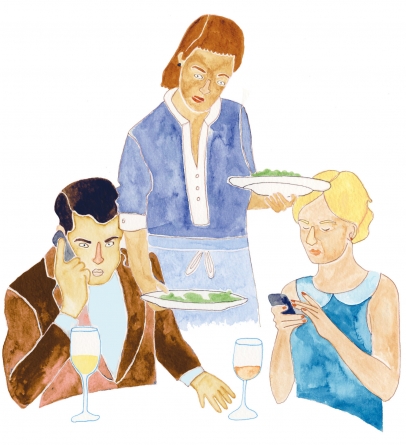Pet Peeves
Restauranteurs Riff on Their Secret Annoyances
No-shows like a reserved party for eight, the day’s produce delivery or the replacement dishwasher can disrupt a commercial kitchen’s flow and its bottom line. Other actions––such as customers pulling out their ubiquitous cell phones to engage in long-winded, loud and disruptive phone conversations or to pose for group selfies––are just plain annoying. To get the inside scoop, we dished with a baker’s dozen of the state’s most knowledgeable restaurant folk about their particular pet peeves. If you, dear reader, recognize yourself—whether as a diner, vendor or employee—here’s your opportunity to look in the mirror and change your ways!
THINK YOU’RE A LOW-MAINTENANCE CUSTOMER?
Guests claiming to be celiac and then ignoring their self-imposed “no gluten” restriction at dessert time is bothersome to owner/chef Kevin Gaudreau of KG Kitchen Bar in Providence. “We design a special menu for a customer who says she is celiac and then, after ordering a chocolate cake for dessert, the customer says, ‘Well . . . I can have a little bit of flour.’ It blows our mind, and it usually happens when we’re really busy and that [disruption] can affect the total flow of our operation.”
Food allergy fakers abound. Chef Gina Pezza of Warwick’s Vanda Cucina recalled a customer who knocked back a White Russian, after insisting she could not consume any dairy.
“Half-baked” complaints from customers who don’t understand what they’re ordering irritate many chefs: The pork belly is too fatty, the salmon in the smoked salmon platter is raw, the grilled chicken sandwich is hot and the list goes on.
One customer at the Beehive Café in Bristol who was reluctant to read the menu, asked, “Can’t I just order what I want?” Clearly ignoring the menu, another Beehive customer, when ordering the egg sandwich––which comes with Cheddar, arugula and sliced tomato–– asked for no tomato, no arugula and no egg. In other words, the order was for a plain grilled cheese sandwich, which, said owner Jennifer Cavallaro, caused the kitchen staff to have a meltdown. Pezza’s recommendation to such customers: “Sometimes you need to let the chef and server guide you to choose something you’ll actually like.”
And, Branden Read, co-owner/chef of Celestial Café in Exeter, remembers a customer who complained that he didn’t like the coffee–– the very same coffee he’d ordered week after week––and didn’t want to pay for it.
Tailoring his business to suit himself, Howard Croft, who owns Kitchen in Providence, says, “Sometimes there’s a learning process for people who come here.” If you prefer a different choice of music, ask for a different preparation of a daily special, want to buy half-a-dozen muffins or pay by credit card, Kitchen’s not the place for you, confirms Croft, who strongly dislikes it when people sit at tables that his crackerjack waitress––whom he calls “a gem in the ocean”––has not yet cleared and bussed. “Do you really want to sit at a table with someone else’s leftovers?”
During busy nights at Siena in East Greenwich, customers chit-chatting with her (while she’s clearly swamped) or customers who linger at the table for 30 minutes after cashing out frustrate server Jennah Sequeira.
“Our pet peeve is when something’s not perfect and we aren’t given the opportunity to do something about it while the customer is still in our restaurant,” says Geremie Callaghan, co-owner of Fluke Newport, speaking for herself and her management team. Like many chefs interviewed, including Beau Vestal, chef/owner of New Rivers in Providence, Callaghan and her team want happy, satisfied and satiated customers.
Last minute no-shows of large parties frustrate Vestal and Callaghan. “It’s tough for small restaurants like ours when this happens. We know people’s plans change, but try to give us a call to give us a heads up,” says Vestal.
EMPLOYEES CAN MAKE OR BREAK A RESTAURANT
“My biggest pet peeve is [staff ] bantering back and forth,” says Richard Allaire, owner and head chef of Metacom Kitchen in Warren. By adhering to professionalism, cleanliness, concise communication and organization, staff can limit the chaos common in many commercial kitchens.
Echoing some of Allaire’s concerns is Ben Lloyd, owner/chef of Salted Slate, and owner of Providence Wine Bar, both in Providence. “If you walk away leaving something messier than you found it, you’re not paying attention; it sets in motion . . . the need for a two-hour marathon cleaning session.”
With ownership interest in several Newport venues, including Midtown Oyster Bar, The Surf Club, Zelda’s and the family-run Landing Restaurant, Patrick Kilroy applies his “French fry test” to assess new hires and evaluate long-term employees. If Kilroy sees employees simply step over a French fry on the ground––which he has deliberately tossed there–– he will remind them to focus on cleanliness and safety, says Kilroy, especially with toddlers and seniors among their customers.
Staff––especially those in the kitchen––who fail to show up without giving notice burns Pezza. “That stresses out everyone.” While all line cooks have their own OCD (obsessive compulsive disorder) thing, Pezza says, hers revolve around staff who put the olive oil container away in the wrong place or use too many kitchen towels that aren’t folded as she prefers.
“When I hear the sounds of glasses and plates breaking,” says Derek Wagner, owner of Nick’s on Broadway and his newest venture, Nick’s on Westminster, “it immediately goes up my spine.”
“Late line cooks and deliveries arriving during service,” says Joe Flowers, The Mooring’s executive sous chef, of his pet peeves. And Sequeira of Siena notes, “When the kitchen doesn’t read the ticket correctly and has to remake the entire dish, it makes the customer angry . . . it affects our bottom line.”
SLIPSHOD SUPPLIERS DISRUPT SERVICE
When the Providence Wine Bar’s wine supplier delivers an incomplete order, Lloyd is left high and dry. “I find out the day of the expected delivery that [my supplier] is out of something; that is completely avoidable,” he says. Then, when a customer comes in and requests that vintage, we have to improvise in the moment and apologize that we didn’t get to change the daily menu, explains Lloyd.
“When we need the product for our menu and we can’t count on it being there, it’s really hard,” agrees Wagner, who has had to part company with farmers and other suppliers who trounce through the dining room in the middle of service. Of the suppliers and job-seekers who show up unannounced on a Friday night to see the chef, Wagner says wryly, “It shows a serious lack of awareness; I don’t know that they’d be a good fit.”
Celestial Café’s Read says tardy liquor deliveries can upset the restaurant’s workflow when they arrive during evening service. “It happens way too often, and it doesn’t give us time to ice down the beer or wine so we end up scrambling right as guests are coming in to enjoy their dinner.”
While these folks willingly shared their work-related pet peeves (and don’t we all have pet peeves?), they all expressed deep satisfaction with their chosen professions. We gave Metacom Kitchen’s Allaire the last word: “It’s our job to do our best for our customers every day; it’s up to us to live up to their expectations.”






